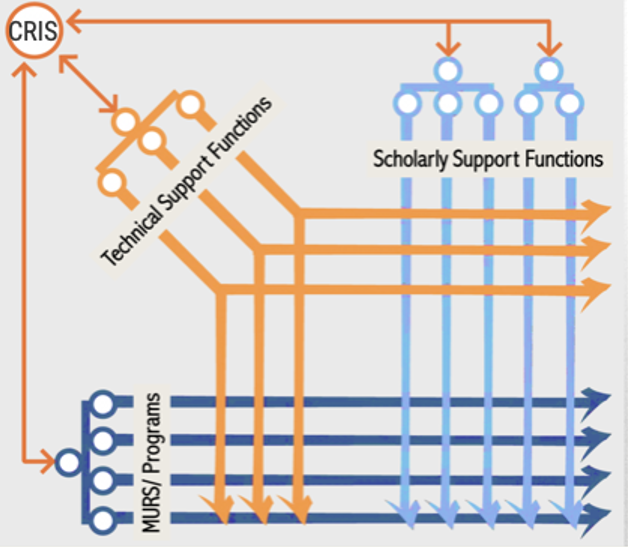CRIS leads health professions education by conducting rigorous, innovative research. We emphasize interdisciplinary collaboration to develop effective educational methods and advance clinical practices. Through these efforts, we aim to discover and implement new solutions that address the challenges in pediatric healthcare.
We foster a culture of continuous learning and innovation by regularly refining our educational programs. Guided by evidence-based theories, we embrace emerging technologies and teaching methods to spark a passion for lifelong learning in healthcare professionals.
CRIS actively promotes scholarship that contributes to progress in health professions education. We encourage knowledge sharing and active scholarly engagement, believing that these pursuits enhance the expertise of healthcare teams and extend CRIS’s impact far beyond institutional walls.
Committed to global health, we collaborate with international partners to share knowledge, expertise, and resources for addressing pediatric health disparities worldwide. Through these global health initiatives, CRIS aspires to be a catalyst for positive change on a global scale.
We equip health profession educators with the knowledge, skills, and tools they need to excel in compassionate, evidence-based care. Our supportive, inclusive learning environment empowers healthcare professionals to make a meaningful difference in the lives of children and families.
CRIS cultivates partnerships with academic institutions, healthcare organizations, industry, and community stakeholders. We value diversity of perspectives and believe that collective expertise drives meaningful change in health professions education and pediatric healthcare.
CRIS leads health professions education by conducting rigorous, innovative research. We emphasize interdisciplinary collaboration to develop effective educational methods and advance clinical practices. Through these efforts, we aim to discover and implement new solutions that address the challenges in pediatric healthcare.
We foster a culture of continuous learning and innovation by regularly refining our educational programs. Guided by evidence-based theories, we embrace emerging technologies and teaching methods to spark a passion for lifelong learning in healthcare professionals.
CRIS actively promotes scholarship that contributes to progress in health professions education. We encourage knowledge sharing and active scholarly engagement, believing that these pursuits enhance the expertise of healthcare teams and extend CRIS’s impact far beyond institutional walls.
Committed to global health, we collaborate with international partners to share knowledge, expertise, and resources for addressing pediatric health disparities worldwide. Through these global health initiatives, CRIS aspires to be a catalyst for positive change on a global scale.
We equip health profession educators with the knowledge, skills, and tools they need to excel in compassionate, evidence-based care. Our supportive, inclusive learning environment empowers healthcare professionals to make a meaningful difference in the lives of children and families.
CRIS cultivates partnerships with academic institutions, healthcare organizations, industry, and community stakeholders. We value diversity of perspectives and believe that collective expertise drives meaningful change in health professions education and pediatric healthcare.
Health professions education unfolds in increasingly complex healthcare environments. This milieu often leads to “wicked problems” – issues that are difficult or impossible to solve because of incomplete, contradictory, and/or changing requirements that are often hard to recognize.
We use a 3-D Matrix Model to create the distributed shape shifting organization that fosters self-organized, cooperative networks of education scholars as the complexity-sensitive approach to addressing wicked problems in health professions education.

Academy of Clinical Teacher
Critical Thinking Lab
Digital Scholarship
Evidence Academy
Educational Games
Network of Practice in Health Sciences Scholarship
Ultrasound Education
Biostatistics
Clinical Teacher Development
Education Scholar Development
Grant Writing
Learning Management System
Game Platforms
Program Aministration
Publishing House
Assessment and Evaluation
Design Thinking/Research
Instruction Technology
Psychometric Studies
Qualitative Research
Research Methodology
Writing and Rhetoric
CRIS draws on the starling’s murmuration model of nature-inspired optimization to form Medical Education Units for Research and Scholarship (MURS). These collaborative networks foster professional development and enhance scholarly productivity within health professions education.
Each MURS is an autonomous network of scholars with shared interests in producing meaningful scholarship. By operating without hierarchies, members explore a broad range of creative approaches. Because MURS function as decentralized intelligence networks, CRIS does not dictate their scholarly pursuits.
Through these distributed networks, CRIS creates an environment where ideas can flourish. The MURS model encourages flexibility, self-direction, and continuous learning—leading to innovative solutions that advance both health professions education and clinical practice.
X Faculty
XYZ salient statistics/info
218 General Pediatrics Trainees
198 Pediatrics Subspecialty Trainees
Pediatrician-Scientist
Global Health
Primary Care L.E.A.D.
Child Neurology
Genetic and Genomic
25 ACGME Accredited Programs
20 Texas Medical Board Accredited Programs
Supporting a vast variety of graduate medical education training programs is our core mission – to create knowledge and apply science and discoveries to further education, healthcare and community service locally and globally.
3 pediatric, stand-alone hospitals in the Greater Houston area
8 Texas Children’s Specialty Care locations
55+ Texas Children’s Pediatrics locations
12 Texas Children’s Urgent Care locations
36,000 admissions annually
40,000+ surgeries annually
157,000 emergency center visits
6,600 births per year
4.6M patient encounters yearly
424,000+ Texas Children’s Health Plan members
15,000 Faculty and staff
1 Academic Partner: Baylor College of Medicine
$70+M dedicated to research each year
1 of the world’s first basic research institutes dedicated to childhood neurological diseases (Jan and Dan Duncan Neurological Research Institute®
To create a healthier future for children and women throughout our global community by leading in patient care, education and research.